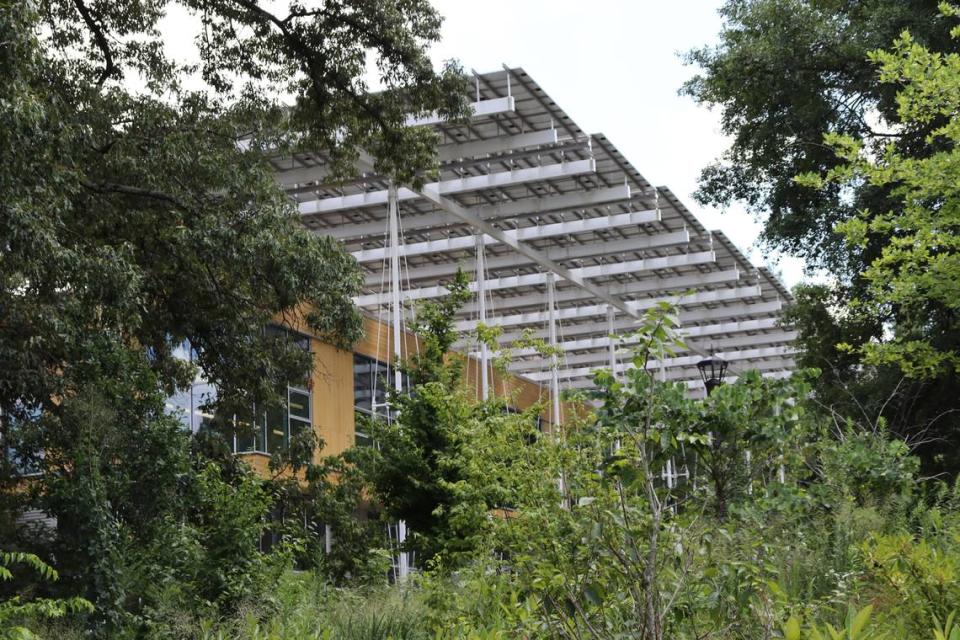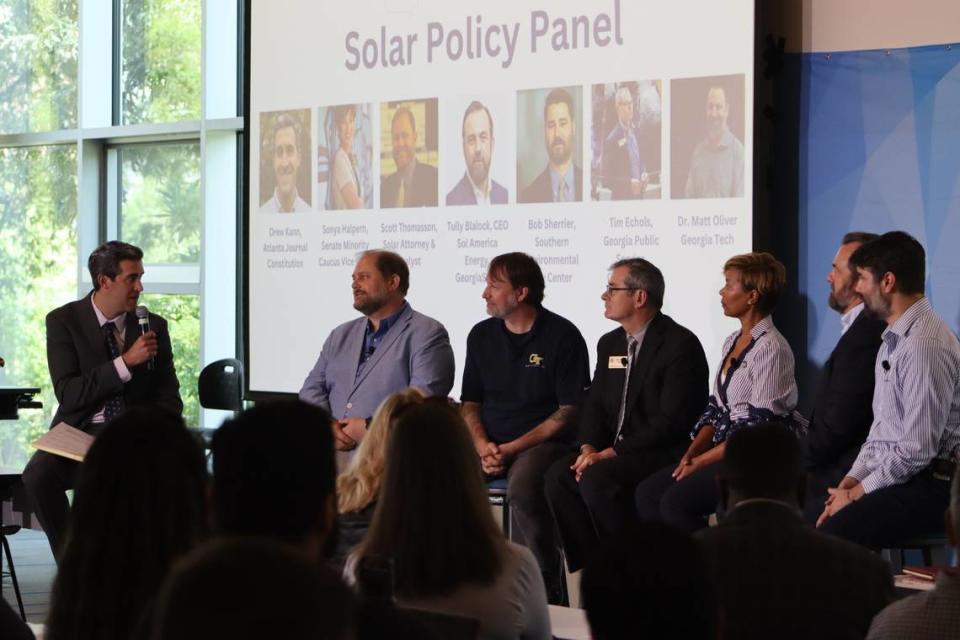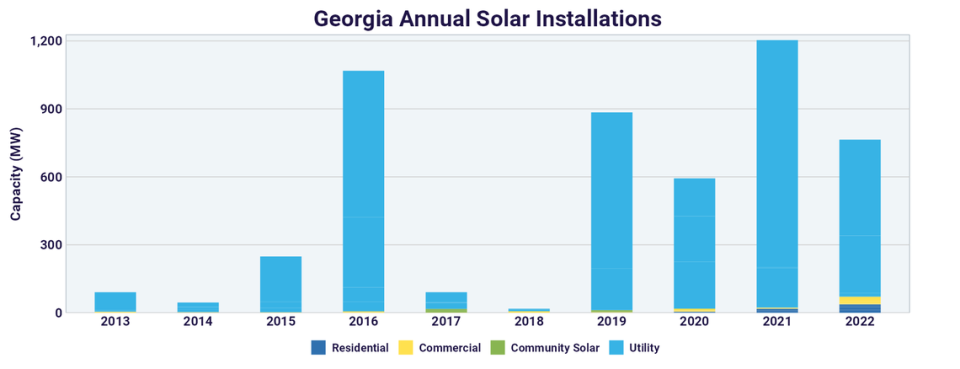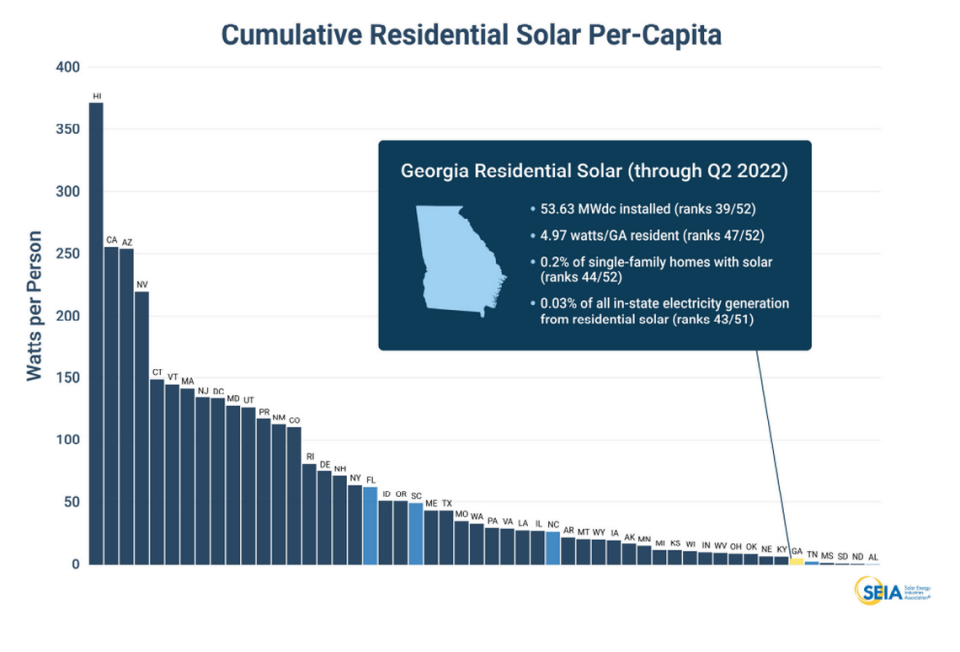Solar power is a cheap, favored form of renewable energy in GA, but residential solar lags
The most affordable form of energy in Georgia has momentous support from both sides of the political aisle — and it’s combating climate change.
“Solar is the cheapest form of energy in Georgia per kilowatt,” Georgia State Sen. Jason Anavitarte said. “Solar is the only issue I know of that polls above 60% for both Republicans and Democrats.”
Last week, a spectrum of solar experts and advocates including politicians, business leaders, lawyers, and professors gave bipartisan support for clean, renewable energy. They called for increased support for community and residential solar, net metering programs that make sense to the consumer, and applauded the work of the Public Service Commission over the last decade.
Fittingly, the symposium was held in the first and largest Living Building in the Southeast, the Kendeda Building for Innovative Sustainable Design at Georgia Tech in Atlanta. The building produces more energy and water than it consumes each year.
The 917 SunPower solar panels on the roof generate 200% net positive energy per year, meaning the panels produce more energy than the building needs to power itself because of how efficient the building is. During the three-hour session, 165 kilowatts of energy were generated.

Because solar power doesn’t emit pollution from fuels like coal, natural gas, or oil, it is considered a climate solution. Emissions add greenhouse gasses to the atmosphere exacerbating the effects of climate change.
But where emissions targets and climate threats fail to motivate politicians, cost and facts thrive.
“As a conservative Republican I like saving people money,” John Szoka, CEO of Conservative Energy Network told the Ledger-Enquirer. “I was a Republican skeptic. The bottom line that converted me to clean energy wasn’t emotion, it was facts.”
Georgia’s solar milestones
Georgia ranks seventh in the nation for total installed solar capacity at 5,041 megawatts (MW) which is enough to power roughly half a million homes.
Exactly 10 years ago to the day, Public Service Commissioner Bubba McDonald pushed for Georgia Power to significantly increase solar capacity. Tim Ecolos, panelist and current PSC commissioner, who voted with McDonald in 2013 said, “We proved [solar] could be done without a subsidy.”
Several other panelists, including clean energy lawyer Scott Thomasson, CEO of Sol America Tully Blalock, gave a nod to this milestone as well as the role public commissioners played in solar development in Georgia.
“The Public Service Commission was instrumental in developing the industry where it is today,” Blalock said.

In 2019, the commission established net metering for rooftop solar. Panelist Bob Sherrier, attorney at Southern Environmental Law Center, considers net metering an important factor in getting more solar energy to Georgians. The net metering program required Georgia Power to purchase excess solar power at the retail rate from rooftop solar systems over the course of the month. This was only open to the first 5,000 customers.
“When you get a fair price and consistent, easy-to-understand policy, people want to invest in their properties,” Sherrier said. “There are policies that work and we know what they are.”
Where solar in Georgia falls short
Only 0.2% of single-family homes have residential solar in Georgia, according to Solar Energy Industries Association (SEIA). Meanwhile, the state ranks seventh in the nation for utility solar. Utility solar is solar power that comes from large photovoltaic (PV) farms. Georgia Tech economics professor Matthew Oliver commented on the wide gap between utility solar and solar power produced directly on the rooftops of homeowners.
“Georgia is way ahead of other states in utility but we’re behind in terms of per capita residential,” he said. “The national average ratio of utility to residential is about 2:1 in terms of capacity. Georgia is 13:1.”


One of the factors that concern Oliver is the “archaic rule” of prohibiting solar on rooftops within HOAs. Some states passed laws that bar HOAs from making such rules, and Georgia is not one of them.
“This goes against an idea of a free market,” Oliver said. “It’s a big barrier. Addressing this will be an important step for the state.”
Incentives and engagement for a bright future
Incentives and digestible policies for Georgians are key to getting more power generated by both utility and residential solar, especially because of the utility monopoly power in Georgia.
“Legislatures need to step in when appropriate,” Blalock said. “We need to make sure we put policies in place to allow consumers to benefit.”
Constituents need to tell elected officials they want more solar, Anavitarte said.
“There is simply no reason not to expand community and residential solar,” he said. “It’s worked well in over half the counties in Georgia and hundreds of thousands of homes and businesses in the Southeast. It’s good for our energy grid, our economy, and our quality of life.”
One of the ways Anavitarte wants to continue to expand solar is through a bill he introduced in February, The Homegrown Solar Act of 2023 (SB 210). Currently supported by four Republican senators and Senate Democrat Sonya Halpern (also a panelist at the event), it would require net metering to be offered by electric utilities. The bill is still active in the Senate Regulated Industry Committee.
During the panel, PSC commissioner Echols made a point to support SB 210.
“This is an important piece of legislation that can go a long way,” he said. “It allows customers including large users of electricity to locate a solar plant to finance or own the facility.”
Echols is confident the state will move from seventh to sixth in Georgia’s installed solar capacity ranking by the end of 2023.

